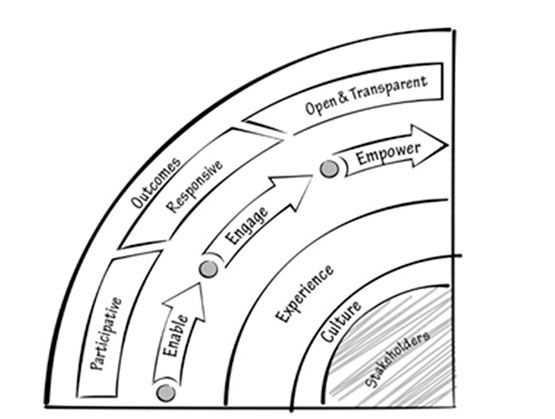How do we measure a nation’s progress? The easiest way is to measure GDP. But, can a single number really capture a nation’s progress? Should Government’s across the globe, small or large, developed or emerging, focus on this singular number? There have been numerous debates on this and the common thread is that GDP might just be good at measuring absolute economic activity and not really the progress of a nation or societal happiness.
Human Development Index, HDI would be a better indicator since it includes income, education and health. Factors that are a direct result of a Government’s policies and execution. Going by the way public sector functions, creating visions or master plans is easy but execution is tedious. Governments have become complex cost-intensive systems, impeded with paperwork which often slows them down. This reflects in inadequate execution of public services and unfulfilled citizen experience.
Digital technologies have the potential to make a dramatic difference to public sector, just the way they’ve revolutionized industries like banking and retail. But therein lies the irony; going digital is not about technology. It’s just a medium. The primacy of digital transformation is in having a customer centric ecosystem which acknowledges their evolving persona. This generation of customers are digital natives, who seek instant gratification and blur the space between virtual and real. Going digital or digital transformation therefore is about rewriting the rules of engagement, about raising the level of experience and setting new standards in stakeholder empowerment.

At the core of digital is the stakeholder or in case of Public Sector - citizen. If that is established for the process of digitization initiative, the rest is simple. The objective of digital consequently, is to strategize, design and provide an engaging experience to the citizens for governance outcomes. The start point of this journey is to “enable” availability of information and services; anytime, anywhere and on any platform or device. Many Governments have managed to execute this, irrespective of gaps in ease of access or user experience. The next challenge is to create a bilateral communication channel or “engage” the citizen. Citizens must be able to offer their views, seek services or provide feedback through these digital channels. An engaging digital platform might appear to be the epitome of Digital Government but it only replicates human to human interactions with human-machine interactions.
A true Digital Government is one where stakeholders are also “empowered” through self-service systems and given control wherever required to minimize bureaucracy and provide prompt services. Therefore the key ingredient to make Digital Government a success is to design processes and services around stakeholder experience. The experience using the digital medium or technology should be natural, intuitive and mimic real world experiences. This requires a fundamental change in the way Governments think and operate - to be in tune with the changing citizen expectations. Eventually, digital governance should lead to the outcomes that governments desire; which is to provide an open and transparent governance, achieve participation from citizens in co-governance and ensure responsiveness.
Coming back to our headline on societal happiness, research indicates that the happiest nations tend to have progress oriented governance. To achieve this, governments are increasingly making digital a priority which in turn means citizens are a priority. With digital transformation, governments can involve citizens and access ideas and talent to build more livable cities, create better public transport, reduce crime, dispense justice faster, turn waste into wealth, improve climate for investment, impact public health, and ensure that everyone has equal access to critical public services-making real what has largely remained a frustratingly elusive goal for governments - a sustainable, progressive and happy society.
Note: In this entire narrative, I did not emphasize the technology aspects such as mobile, social, analytics devops, engineering etc. as I believe technology is a medium to achieve the outcomes.
Ashok Tripathy- Vice President And Global Head, Public Sector (Govt.) & Higher Education, Wipro, Ltd.
Ashok Tripathy is Vice President and Global head of Public Sector (Govt.) & Higher Education Vertical at Wipro. He is responsible for running the Public-Sector business, shaping industry domain solutions and ensuring customer satisfaction through effective service delivery. A multifaceted professional, prior to this role, he has provided leadership to IT Infrastructure products & services, Enterprise Technology and System Integration business units. He has also worked in diverse areas including Corporate Planning, Business Alliances, and Strategic Hiring in Human Resources.
Ashok holds an Engineering degree in Electrical & Electronics engineering from Birla Institute of Technology, India with distinction and an MBA from Xavier Institute of Management. Handpicked from campus, he was awarded the Best Sales person across the organization in his formative years. He has now completed over two decades in the organization and is currently based in Bangalore.
Ashok is a hands-on leader who places a strong emphasis on client focus, people and collaboration to deliver beyond expectations. He is well regarded for his work on the fundamental aspects of value propositions, strategy, restructuring and turning around of business. Driving business profitability, enhancing brand visibility, scaling of alliances & services and Wipro’s No 1 Green Ranking are some of the key successes of the team Ashok has led. In his free time, he enjoys racquet sports i.e. squash & badminton